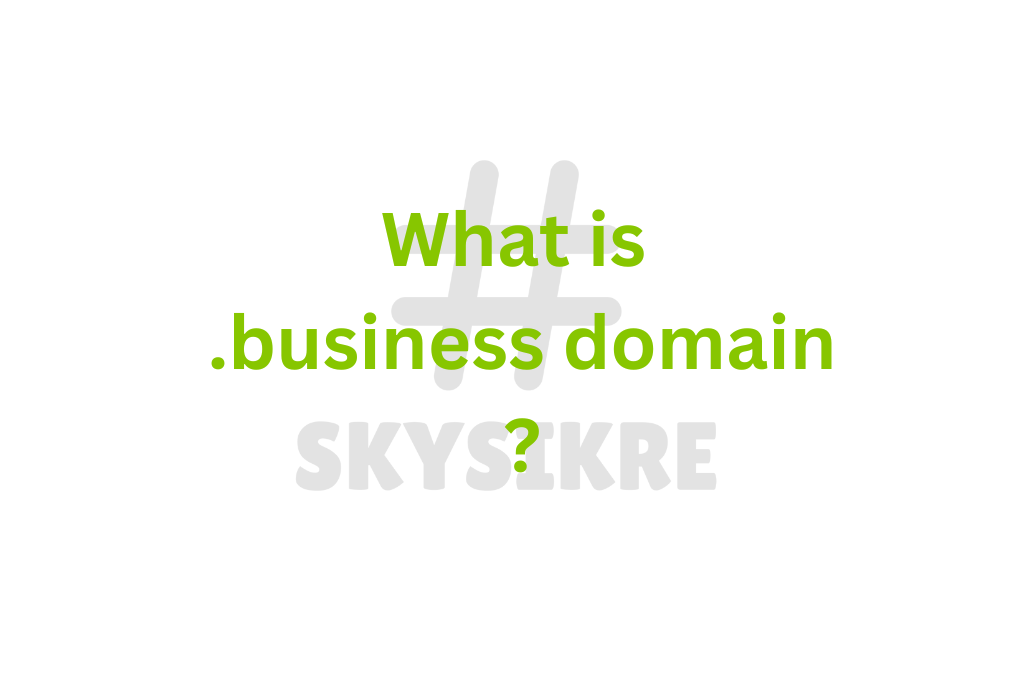Introduction to the .business Domain
The .business domain is a specific top-level domain (TLD) that is utilized primarily by enterprises, companies, and various business entities. In the realm of the internet, TLDs serve as the suffixes that categorize domain names into groupings based on type or purpose. While familiar TLDs like .com, .org, and .net dominate the internet landscape, the emergence of more specialized domains, such as .business, enables businesses to establish a clear and relevant online identity.
The significance of the .business domain lies in its ability to convey the professional nature of a website immediately. It indicates to visitors that the site is devoted to business-related activities, whether that entails service offerings, e-commerce, information dissemination, or corporate branding. The .business domain benefits companies by enhancing their credibility and providing a distinct online presence that may appeal to potential customers, partners, and stakeholders. This domain extension helps clarify the purpose of the website from the very beginning, which is essential in today’s competitive digital landscape.
The Meaning and Purpose of .business
The .business domain is a top-level domain (TLD) specifically designed for the needs of businesses operating in the online marketplace. It serves as a digital identifier that communicates a clear message to consumers regarding the commercial focus of the website. By opting for a .business extension, companies can create a professional online presence that aligns with their business objectives, making it easier for customers to recognize their core focus.
The intention behind the creation of the .business domain was to cater to the increasing demand for specific, contextually relevant domain names tailored to various industries. Unlike general TLDs, such as .com or .net, the .business extension directly conveys a professional purpose, helping organizations stand out in a crowded digital landscape. The usage of a specialized domain like .business can also enhance trust and credibility, as it signifies that the entity operates for commercial purposes and not just for personal or informational reasons.
Moreover, companies can benefit from improved search engine optimization (SEO) rankings by utilizing a .business domain. This is achieved through targeted keywords that enhance the likelihood of appearing in search results relevant to their products or services. As businesses increasingly recognize the importance of a strong online presence, the .business domain becomes a valuable asset for branding. By clearly indicating their commercial intent, organizations can attract a more targeted audience and foster growth in their market segment.
In essence, the .business domain is more than just a web address; it represents a strategic choice for businesses looking to assert their identity in the digital realm. This domain fulfills vital functions such as enhancing online visibility, establishing a professional image, and ultimately connecting with consumers who are searching for specific business solutions. Through its adoption, companies can effectively communicate their objectives and solidify their position in the competitive online marketplace.
Who Can Register a .business Domain?
The .business domain is a popular choice among various entities seeking to establish an online presence tailored specifically for commercial purposes. The eligibility to register a .business domain is notably flexible, making it accessible to a wide range of individuals and organizations. Primarily, any legitimate business entity—whether incorporated, a partnership, or a sole proprietorship—can secure a .business domain name.
Entrepreneurs seeking to launch startups often find the .business domain particularly advantageous. By choosing a .business domain, they can immediately convey the purpose of their website, signaling to visitors that the platform is focused on commercial activities. For instance, a new coaching service might register a .business domain to highlight its services and attract potential clients effectively.
In addition to startups and individual entrepreneurs, established companies of all sizes can also benefit from registering a .business domain. For example, a small local bakery aiming to expand its customer base online can use the .business domain to create a professional website that showcases its offerings. Similarly, larger corporations looking to promote a specific product or service can utilize a .business domain to create focused landing pages that enhance their marketing efforts.
Furthermore, organizations that operate in the nonprofit sector but engage in business-like activities can also register .business domains. For example, a nonprofit involved in social entrepreneurship might choose a .business domain to feature its initiatives and drive funding efforts.
In summary, the .business domain is a versatile option for a diverse array of commercial entities, ranging from solo entrepreneurs to large corporations and nonprofit organizations involved in business activities. This flexibility encourages a broad spectrum of users to establish a professional online presence and effectively communicate their business objectives. Being mindful of the target audience and purpose is essential when selecting a .business domain for registration.
Benefits of Having a .business Domain
Securing a .business domain presents numerous advantages for businesses looking to establish their online presence. One of the most significant benefits is the improvement in credibility. A domain name ending in .business signals to potential customers that you are a legitimate and professional entity. This can greatly influence first impressions, as consumers often trust businesses that have specialized domain extensions over more generic ones.
Another notable advantage is the branding opportunities that come with a .business domain. This extension allows companies to create memorable and descriptive web addresses that reflect their services. A well-chosen .business domain complements marketing strategies, making it easier for customers to recall and revisit your site. A distinct domain can act as a strong visual identifier for a brand, further differentiating it from competitors in various industries.
The impact on search engine optimization (SEO) should not be overlooked. A .business domain can enhance your online visibility when appropriately utilized alongside targeted keywords in your content. Search engines recognize domain extensions, and a relevant .business domain may give an edge in search engine rankings, especially for business-related queries. This optimization potential can lead to increased traffic and better engagement with targeted audiences.
Finally, a .business domain fosters better customer recognition and trust. By utilizing this specific domain extension, customers can easily identify your site as a place to find business-related services. This clarity can help in establishing a loyal customer base, as individuals are likely to return to platforms they deem trustworthy. As businesses continue to operate in an ever-evolving digital landscape, the strategic use of a .business domain will undoubtedly play a critical role in shaping a successful online identity.
How to Choose the Right .business Domain Name
Selecting an effective .business domain name is a critical decision that directly impacts your online presence and brand identity. A well-chosen domain name enhances your visibility in the digital landscape, making it easier for potential customers to find and remember your business. Here are several tips and best practices to consider when choosing a .business domain name.
First and foremost, ensure that your domain name is relevant to your business. It should reflect your brand’s identity and core offerings. Incorporating keywords that describe your products or services can be beneficial for search engine optimization (SEO). For example, if you run a consulting firm, including terms like “consulting” or “advisory” in your domain can improve its relevance. However, striking a balance between using keywords and maintaining simplicity is vital.
Simplicity plays a significant role in how easily your audience can recall your .business domain name. Opt for a name that is easy to spell and pronounce. Avoid using special characters, numbers, or complex phrases that may confuse potential visitors. Additionally, shorter domain names tend to be more memorable, so aim for brevity without sacrificing clarity.
Memorability is another key factor. Your domain should be catchy and easy for customers to remember, encouraging them to return to your site. Utilizing alliteration or rhyming can make your domain stand out in the minds of your audience. Furthermore, ensure that the name aligns with your overall business strategy; it should resonate with your target audience and encapsulate the value your business provides.
In summary, carefully selecting a .business domain name involves considering relevance, simplicity, and memorability while also ensuring alignment with your brand strategy. By following these guidelines, you can establish a strong online presence that effectively represents your business to prospective customers.
How to Register a .business Domain
Registering a .business domain is a straightforward process that can significantly enhance your online presence. The first step in this process is to check the availability of your desired domain name. This can typically be done through various domain name registrars or through specific tools available online. Input your desired .business domain name to see if it is available; if it is not, consider alternatives that reflect your brand.
Upon confirming domain availability, the next step is to choose a reputable registrar. There are many registrars available, including well-known options such as Skysikre, GoDaddy, Namecheap, and Google Domains. When selecting a registrar, consider factors such as pricing, customer support, and any additional features they offer, like privacy protection. This decision is crucial, as the chosen registrar will be responsible for managing your domain registration.
After choosing a registrar, proceed to complete the registration process. This will typically involve creating an account with the registrar, filling out your contact information, and agreeing to the terms of service. Subsequently, you will be prompted to enter your desired .business domain name and pay the required registration fee. It’s important to ensure that the contact details you provide are accurate, as they may be used for verification purposes.
Once you have successfully registered your .business domain, you will gain access to a management dashboard provided by your registrar. Here, you can configure various settings, such as DNS records, domain forwarding, and renewals. Regularly managing and renewing your domain ensures that you maintain ownership and avoid any interruptions in your online presence. This registration process is essential for establishing credibility in today’s digital landscape, allowing businesses to effectively communicate their mission through a professional domain name.
Real-life Examples of .business Domains
The utilization of the .business domain has gained traction in various industries, providing businesses with a unique online identity that is both relevant and memorable. One prominent example is a marketing agency that adopted the .business domain to reflect its mission and expertise. By choosing a domain such as “innovativemarketing.business,” the agency not only enhanced its searchability but also communicated its specialization clearly to potential clients. This strategic choice helped position the agency as an industry leader and significantly boosted its online presence.
Another compelling instance is that of a local bakery that transitioned to a .business domain. By adopting “sweetdelights.business,” the bakery distinguished itself in a crowded market. The domain not only provided clarity regarding the nature of their business but also improved their branding. Customers were drawn to the domain’s legitimacy and professionalism, resulting in higher foot traffic and online sales. These kinds of domains promote trust and encourage engagement, which are vital components in today’s competitive landscape.
These examples showcase how businesses across various sectors are harnessing the power of the .business domain to enhance their online identity. This strategic choice leads not only to improved visibility but also to a stronger trust factor among consumers, ultimately results in increased engagement and growth.
Challenges and Considerations
When selecting a .business domain, there are several challenges and considerations that entrepreneurs and organizations should be aware of. One of the primary challenges lies in the increasing competition among domain names. As the internet continues to expand, the availability of desirable domain names is diminishing. This may require businesses to be flexible and creative when choosing their domain name, possibly leading to longer or less intuitive names that can be harder for potential customers to remember.
Another critical consideration is the potential for trademark issues. Ensuring that your chosen .business domain does not infringe upon existing trademarks is paramount. Businesses must conduct thorough research to verify that their domain name does not unintentionally mimic or duplicate another brand’s identity. Failure to do so can lead to legal disputes that consume both time and resources, ultimately detracting from the growth of the business.
Furthermore, adopting a .business domain necessitates a long-term strategy. Businesses should carefully consider the implications of their domain choice on their brand identity and marketing efforts. It is advisable to select a domain name that aligns with the company’s mission and values, as well as one that is likely to remain relevant as the business evolves. An uninformed or impulsive registration may lead to difficulties in rebranding in the future, which can jeopardize customer recognition and loyalty.
In light of these challenges, businesses must approach the registration of their .business domain with diligence. This ensures not only the selection of a suitable domain name but also the establishment of a sustainable online presence that supports their long-term goals.
The Future of .business Domains
The digital landscape is continually evolving, and the .business domain is poised to play a significant role in this transformation. As businesses increasingly turn to online platforms for engagement, management, and sales, the adoption of a .business domain becomes an essential strategy for fostering identity and credibility. The anticipated growth of this domain extension aligns with the requirement for specificity in a saturated online market, aiming to make business-related websites instantly recognizable.
The rising trend towards specialization suggests that more businesses will seek domain names that reflect their unique offerings and values. For instance, startups, small enterprises, and even established corporations may gravitate toward .business domains to communicate their commitment to professionalism and innovation. This domain extension signals business intent directly to consumers and stakeholders, enhancing visibility in search engine results, which can ultimately lead to increased traffic and customer engagement.
As the digital marketplace becomes more competitive, companies may need to reconsider their online strategies to incorporate effective use of .business domains. This may involve optimizing their websites for search engines, utilizing content marketing, and engaging with customers through various digital platforms. Furthermore, businesses can leverage the .business domain to create targeted landing pages that cater to specific services or audience segments, directing customer attention where it matters the most.
Overall, the future of .business domains appears promising as they provide businesses with the opportunity to distinguish themselves in the marketplace. As trends continue to develop in areas such as e-commerce, digital marketing, and online networking, those who effectively adapt to the significance of a .business domain will likely benefit from increased recognition and trust within their industries.






